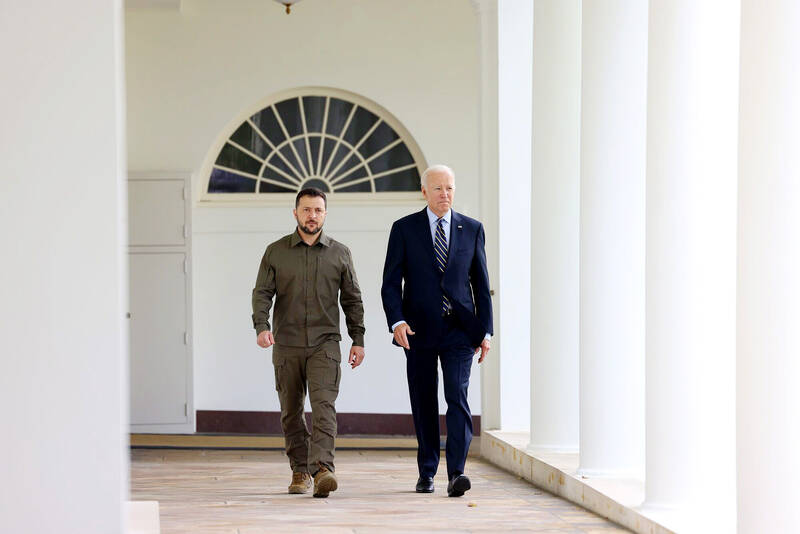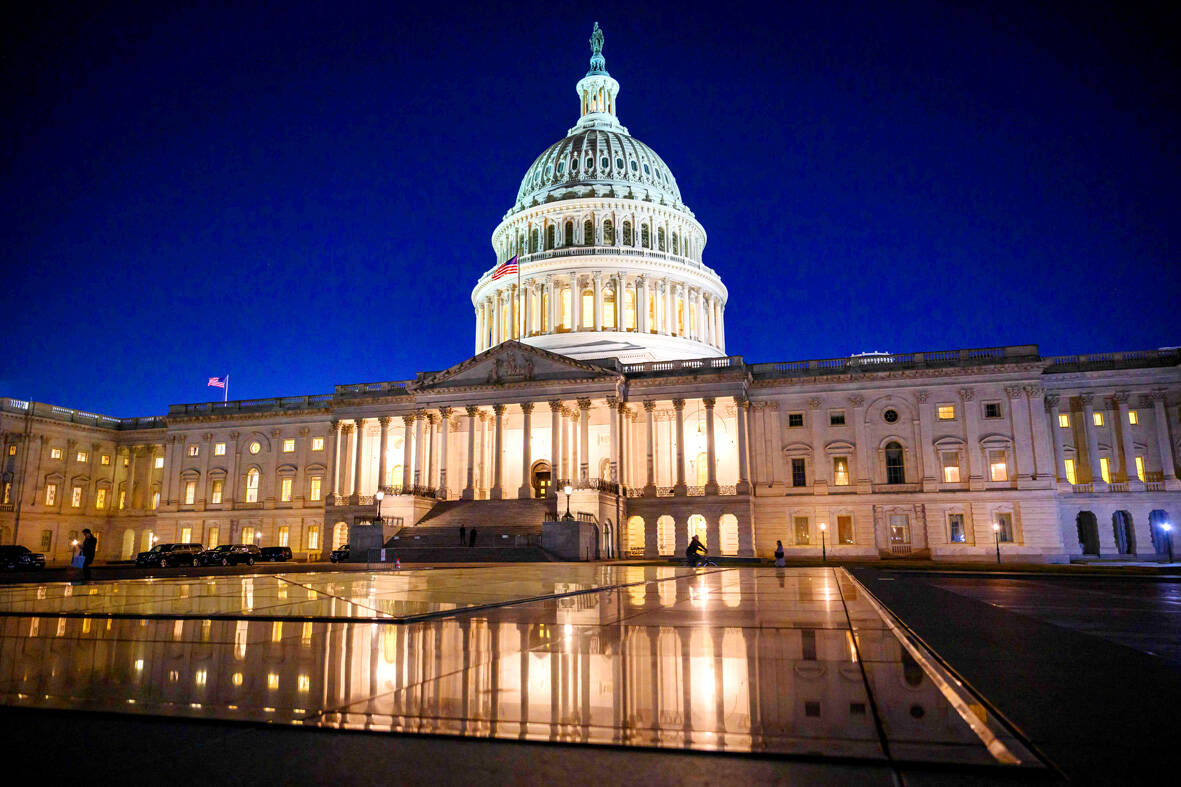Last week Coen Blaauw, who had spent so many years advocating for Taiwan in various positions in the Formosan Association for Public Affairs (FAPA), received one of the highest awards Taiwan can give a foreigner, the Order of the Brilliant Star with Special Grand Cordon. A richly deserved highlight to a long and distinguished career, the award came as Washington, where Blaauw had spent so many years in tireless effort, is undergoing terrifying changes.
Taiwan’s envoy to the US, Hsiao Bi-khim (蕭美琴), who conveyed the award, said at the ceremony that “FAPA and Blaauw’s hard work and dedication had helped to build tremendous bipartisan, bicameral support for Taiwan on Capitol Hill.”
Hsiao’s remarks represented a fond look back at different days, when the Republican Party was a reliable supporter of Taiwan and its people. Individual Republicans had different reasons for their differing positions on Taiwan, some personal, some more political and strategic, but there was widespread unity in the party on the Taiwan issue.

Photo: Bloomberg
WORRYING SIGNALS
Ominous signals last week in the wake of the idiotic budget hostage-taking: 315 congresspersons voted for a Republican-led budget to fund the government for 45 days to prevent a complete stoppage of the government, but aid to Ukraine was dropped from the bill.
We are just lucky the Republican Party’s annual outbreak of unserious failstate budget antics coincides with typhoon season in the Taiwan Strait.

Photo: AFP
The People’s Republic of China (PRC) was watching closely, no doubt with deep satisfaction at the success of its mouthpieces and fellow travelers in the US in shaping both the budget debate and public opinion. This success was epitomized last week as representatives of Code Pink, once a respected anti-war organization, now a propaganda outfit for the PRC and Russia that calls for endless war, imperialism and the dismemberment and annexation of Ukraine and Taiwan by their respective authoritarian enemies, was approached by Congresswoman Margery Taylor Greene, a virulent supporter of former US president Donald Trump, for a selfie with her.
Greene, like many Trumpists, is an opponent of Ukraine aid, as is Code Pink. Another example of this meeting of minds also occurred last week when Ben Norton, the well-known pro-Russia and pro-PRC tankie commentator, in a series of posts on Twitter, exposed his falling out with his fellow travelers at The Grayzone, a disinformation site that, as Wikipedia puts it, is known for its “sympathetic coverage of authoritarian regimes.” Norton said he left the site over “its opportunist right-wing turn,” and said that its head, Max Blumenthal, had deliberately set out to court “Trump’s MAGA supporters.”
It would be comical, the way the two extremes of right and left have met, if their union weren’t over the dead bodies of so many brave Ukrainians. And if it didn’t suggest scary things about the future.
ALARMING POLLS
There are ominous signals in the noises of recent polls. A recent poll from the Chicago Council on Global Affairs found that 50 percent of Republicans support continued arms assistance to Ukraine, a decline of 18 points in a year, and 30 points from February last year, when the war began. Meanwhile, Democratic support remained stable at 77 percent, declining just two points in a year.
The poll found broadly similar splits between the parties on major issues. Only four in 10 supported negotiations if it meant Ukraine ceding territory to Russia, but 50 percent of Republicans held that position, and 66 percent of Republicans encouraged negotiations. More than 55 percent of Republicans were against sending F-16s to Ukraine.
This poll was no outlier. A July CNN poll found that 57 percent of respondents leaning-Democrat thought the US should do more for Ukraine, while just 39 percent of Republicans felt that way.
The unceasing propaganda barrage is having a growing effect, occurring as it is when the Republican party is retreating into know-nothingness and isolationism. Ukraine, to our time what the invasion of China by Japan was in the late 1930s, is slowly becoming another partisan issue.
The deliberate “partisanization” of issues has been a tactic used to delay or destroy comprehensive responses to urgent US national issues such as climate change. Is it in our future?
At present the Congressional Taiwan Caucus, at 229 members, is the largest Congressional Member Organization in the US Congress. It was founded in April of 2002 by founding co-chairs Sherrod Brown (D-OH), Steve Chabot (R-OH), Dana Rohrabacher (R-CA) and Robert Wexler (D-FL). Thanks in part to the fine work of people like Coen Blaauw, Congress still exhibits robust bipartisan support of Taiwan.
TRUMP AND TAIWAN
Many of the legislators who have opposed Ukraine aid are supportive of Taiwan. A large chunk of those legislators are Trump supporters. Trump himself, in a July interview with Fox, was widely seen as hinting that he would not order the US to defend Taiwan if he were elected president. Trump repeated this position last month in an interview with NBC’s Meet the Press.
Former US National Security advisor John Bolton stated in a book on his time in the Trump White House that Trump repeatedly belittled Taiwan. In 2019 Bolton said: “Trump once told me, I never want to hear from you about Taiwan, Hong Kong or the Uyghurs…”
Josh Rogin reported in his 2021 book Chaos Under Heaven: Trump, Xi and the Battle for the Twenty-First Century that Trump told a Republican senator that if the PRC attacks: “We are eight thousand miles away. If they invade, there isn’t a fucking thing we can do about it.”
In the first Trump administration there was a deep leaven of intelligent, experienced, pro-Taiwan Republican officials. Many of these are likely to remain on the sidelines in a second Trump administration.
Instead, if Trump is re-elected, the know-nothings and isolationists will continue to expand in the Republican party and in the government. Recall that when Trump was president the US exited numerous global organizations, gravely harming its international position. Sooner or later, the know-nothing wing of the Republican party will come round to the PRC line on Taiwan. Even if they don’t, they are unlikely to break with their leader over Taiwan.
We will then see the outcome Taiwan supporters have struggled and struggled to prevent: Taiwan will become just another partisan football in American politics.
The PRC has extensively studied the US information ecosphere, and will have noted the shifts in public opinion in the US as the war drags on. Inducing war-weariness in the US will become a factor in PRC thinking about the Taiwan scenario. They also understand that causing partisan breaks over issues is a useful long-term move in service of their goals.
It is vital that Taiwan and the US coordinate and deepen their responses in the information war against the onslaught of PRC disinformation, and that we Taiwan supporters redouble our efforts and outreach to both parties, to blunt attempts to turn the island’s future into a partisan political issue.
Notes from Central Taiwan is a column written by long-term resident Michael Turton, who provides incisive commentary informed by three decades of living in and writing about his adoptive country. The views expressed here are his own.

June 23 to June 29 After capturing the walled city of Hsinchu on June 22, 1895, the Japanese hoped to quickly push south and seize control of Taiwan’s entire west coast — but their advance was stalled for more than a month. Not only did local Hakka fighters continue to cause them headaches, resistance forces even attempted to retake the city three times. “We had planned to occupy Anping (Tainan) and Takao (Kaohsiung) as soon as possible, but ever since we took Hsinchu, nearby bandits proclaiming to be ‘righteous people’ (義民) have been destroying train tracks and electrical cables, and gathering in villages

Dr. Y. Tony Yang, Associate Dean of Health Policy and Population Science at George Washington University, argued last week in a piece for the Taipei Times about former president Ma Ying-jeou (馬英九) leading a student delegation to the People’s Republic of China (PRC) that, “The real question is not whether Ma’s visit helps or hurts Taiwan — it is why Taiwan lacks a sophisticated, multi-track approach to one of the most complex geopolitical relationships in the world” (“Ma’s Visit, DPP’s Blind Spot,” June 18, page 8). Yang contends that the Democratic Progressive Party (DPP) has a blind spot: “By treating any

This year will go down in the history books. Taiwan faces enormous turmoil and uncertainty in the coming months. Which political parties are in a good position to handle big changes? All of the main parties are beset with challenges. Taking stock, this column examined the Taiwan People’s Party (TPP) (“Huang Kuo-chang’s choking the life out of the TPP,” May 28, page 12), the Democratic Progressive Party (DPP) (“Challenges amid choppy waters for the DPP,” June 14, page 12) and the Chinese Nationalist Party (KMT) (“KMT struggles to seize opportunities as ‘interesting times’ loom,” June 20, page 11). Times like these can

Swooping low over the banks of a Nile River tributary, an aid flight run by retired American military officers released a stream of food-stuffed sacks over a town emptied by fighting in South Sudan, a country wracked by conflict. Last week’s air drop was the latest in a controversial development — private contracting firms led by former US intelligence officers and military veterans delivering aid to some of the world’s deadliest conflict zones, in operations organized with governments that are combatants in the conflicts. The moves are roiling the global aid community, which warns of a more militarized, politicized and profit-seeking trend